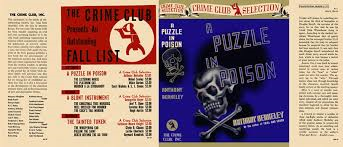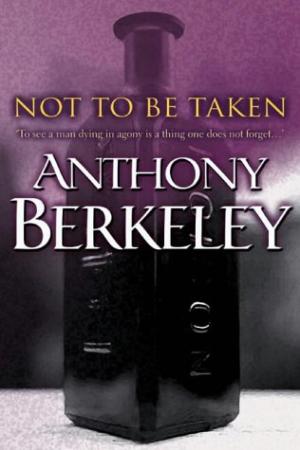This is my first new to me Berkeley novel in quite a while. I love his work as Francis Iles; Malice Aforethought (1931) and Before the Fact (1932), but I have had a more mixed experience with his Berkeley novels, particularly his Roger Sheringham ones.

Berkeley has quite the reputation for writing mystery novels which stretch the boundaries and bend or break the rules, but interestingly this one for me seemed much more conventional. There were no Roger Ackroyd type surprises. Yet I wouldn’t say this is a bad thing and it shouldn’t put you off giving it a try if you can track down a copy.
The story is narrated by Douglas Sewell, a fruit farmer, who lives in a Dorset village named Annepenny with his wife, Frances. Within a page we already have the suspicious death we have been waiting for: John Waterhouse, who has retired to the area with his hypochondriac wife, Angela, has died a not hugely pleasant but seemingly natural death. Yet Berkeley does not plunge us straight into an investigation. Instead he has his narrator go back in time and look at the events leading to the fateful day. They appear quite innocuous, but as the reader will eventually find out they are of the gravest importance. Foul play is eventually cried by the deceased’s brother, Cyril, though his certainty that John was poisoned seems quite suspicious in itself. It is through his actions that police attention is centred on John’s widow, much to the consternation of her neighbours.

Our narrator is not chummy with the police. There are no calls for amateur assistance and this case is observed from outside of the police investigation, giving it quite a naturalistic effect. Although commencing as a slow burner novel the plot soon throws up a number of surprises, especially during the inquest which goes over several chapters. Characterisation is definitely a defining aspect of this novel. Berkeley packs in a lot of character complexity, with highly nuanced psychology. Yet the story does not drag or feel padded in any way. Berkeley also creates a very mistrustful and anxious environment in his story, which comes through effectively in Douglas. There are moments of introspection revealing a narrator who is insecure and unsure of those around him. He often wonders how well he really knows those nearest to him and wonders what things people are hiding, a trope modern crime fiction often utilises and it is a trope well used in this book where our seemingly nice victim is far more complex.
Berkeley is known for his disparaging attitude towards women and in some of his mysteries this can be very repelling. However I think he keeps it in check here and in fact one of the central female characters is a very intelligent and capable woman, yet is not shown to be a dominating busybody which can happen in fiction from this time. That is not to say she is a wholly positive character though, her scientific way of thinking is rather unfeeling at times, leaning towards eugenics. Yet again this element is controlled and in a way for me reflected the issues and debates of the time. There is though one moment of gender double standards. Nevertheless pockets of humour also appear in the text, such as John’s massively understated reaction whilst he is dying and Berkeley also includes a delightful moment of parody with the Scotland Yard officials with their exaggerated politeness.
At the beginning of one of the chapters Berkeley through his narrator baulks at the idea of the story being a detective novel, which I found quite intriguing:
‘If this account of John Waterhouse’s death is to be considered as a detective story, I suppose I am telling it quite wrongly. After all these pages I have only just reached the point at which a detective story usually begins: with the mysterious death and the inevitable problem of accident, suicide or murder. All the various events which I have already set out would be brought to the reader’s notice later, under the questioning of the detective.’
In one sense this narrative structure could remind one of Heyer’s novels which often spend half the story building up to the murder, showing the reader the events prior to it. But what I think makes this story diverge from this comparison is that we never get into the policemen’s heads after the murder and what they do say out loud is very minimal. This is a complete crime which is viewed from an outsider perspective which does have some interesting effects on the reading experience.
When reading this book I was wondering whether this was a fair play mystery, as pieces of information did seem to materialise quite late in the story. This didn’t hugely affect my  enjoyment of the book but it did as I say make me wonder. So I was quite surprised when pages from the end Berkeley unfurls a challenge to the reader, asking the reader to answer various questions based on the information Douglas had at his disposal. I had my own ideas as to the solution but of course they were completely wrong, having been fooled by a red herring. Yet when the solution is revealed it is easy to go back in your head and see where the clues pointing to the killer were. Nonetheless I think this is quite a hard mystery to solve. In keeping with the trademark Berkeley style the ending is suitably unsettling. So although there wasn’t any grand trick or twist I think this was an entertaining mystery, with a tricky puzzle and memorable characters and it was refreshing to see Berkeley tackle a more conventional plotline.
enjoyment of the book but it did as I say make me wonder. So I was quite surprised when pages from the end Berkeley unfurls a challenge to the reader, asking the reader to answer various questions based on the information Douglas had at his disposal. I had my own ideas as to the solution but of course they were completely wrong, having been fooled by a red herring. Yet when the solution is revealed it is easy to go back in your head and see where the clues pointing to the killer were. Nonetheless I think this is quite a hard mystery to solve. In keeping with the trademark Berkeley style the ending is suitably unsettling. So although there wasn’t any grand trick or twist I think this was an entertaining mystery, with a tricky puzzle and memorable characters and it was refreshing to see Berkeley tackle a more conventional plotline.
Rating: 4.25/5
Vintage Mystery Scavenger Hunt Item: Bottle of Poison
See also: The Poisoned Chocolates Case (1929)
I liked this one – it was for me the next best novel by Berkeley after ‘The Poisoned Chocolates Case’. But then again, I haven’t read ‘Jumping Jenny’, which I’m saving for the last. 🙂
LikeLiked by 1 person
Given how similar your reading tastes are to JJ, it surprises (pleasantly of course) that you liked this one, given JJ’s strong disliking of it. I wasn’t aware Jumping Jenny was one of his best ones. Have to see if I can track a copy down.
LikeLike
As I’ve already said elsewhere, I see this book as a stain on the career of Berkeley and would happily wipe it out of existence — the final solution is reached by two characters wilfully dismissing perfectly valid explanations based purely on their say-so. And there’s already been an author-insert character going on about just how possible it would for absolutely anyone to be guilty…this feels like another innovation, though one that didn’t work in the way he intended.
I think you’re right about him tackling something more conventional, but I think he also got a bit bored and so had to change things to keep it within his usual purview — the sudden reversal at the inquest, for instance (though that’s met with such disinterest that you have to wonder if everyone wasn’t already bored to tears and asleep — it changes everything and weirdly NO-ONE SEEMS TO CARE!!</i). So as one of his experiments it also fails for me. Which didn't leave much for me to enjoy, really 🙂
LikeLiked by 1 person
haha glad we see eye to eye on this book then! Been a while since we’ve so drastically diverged on a book or author. I think I’ve missed it!
LikeLike
[…] is the next review in my recent spate of blogging on Anthony Berkeley’s work. Whilst A Puzzle in Poison (1938) by Berkeley’s standards was quite a conventional story, we are back to the unconventional […]
LikeLike
[…] The Poisoned Chocolates Case (1929) […]
LikeLike
[…] of Poison: A Puzzle in Poison by […]
LikeLike
[…] A Puzzle in Poison (1938) […]
LikeLike
[…] A Puzzle in Poison a.k.a. Not to be Taken (1937) – This is a non-series novel by Berkeley and follows more conventional mystery lines, though this is not to its detriment. The reader follows the events leading up the death of John Waterhouse, which is may or may not be from natural causes. The case is observed from outside of the police investigation and with no insider information, a more naturalistic effect is accomplished. I’ve described this book as a slow burner, yet this is no criticism and Berkeley did a good job of providing engaging character complexity as well as a few plot surprises. Unlike some of the titles already looked at this title didn’t feel like it was dragging on. Yet puzzle fans shouldn’t write this book off as near the end of the story, Berkeley issues a challenge to the reader, asking for answers to various questions, which the reader ought to be able to answer from the information the narrator had at their disposal. […]
LikeLike
[…] you can trust it. There were a couple of other Berkeley novels I considered adding to this list (Not to be Taken and Trial and Error) but I decided to be good and restrain […]
LikeLike